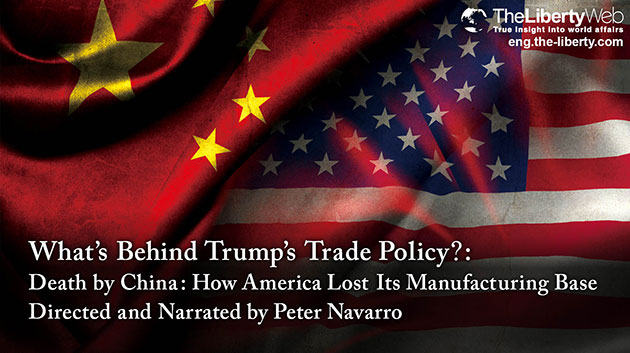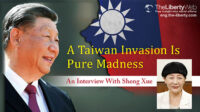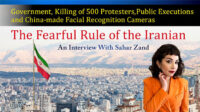What’s Behind Trump’s Trade Policy? : Death by China: How America Lost Its Manufacturing Base Directed and Narrated by Peter Navarro
President Trump’s Trade Policy is often regarded and criticized as “protectionism” by free trade supporters. Is it appropriate to label him as protectionist? Is it really single most important thing to import cheaper goods from overseas despite losing jobs at home?
In order to look closely about Trump’s trade policy, it would be helpful to look at what thought NTC’s Peter Navarro’s has on trade.
Death by China examines the U.S. China trade relationship and how it went so off course from the stated goals of China’s admission to the World Trade Organization (WTO) in 2001 when President Clinton saw a “future of peace and security for Asia” and a bright future promised for American workers and manufacturing by the opening of this new market. For America, nothing could have been further from the truth.
Since the inclusion of China in the WTO, we have seen the rapid growth of the Chinese economy and military, aided, in a de facto sense, by the influx of American dollars that have poured into China – virtually the only export America has made in this one-sided trade agreement that has been a complete disaster for the American worker and economy.
Peter Navarro’s video discusses how America factories and jobs have disappeared; how America has lost its manufacturing base; how China owns more and more of our debt; the deep problems caused by Chinese currency manipulation and the attack on American intellectual property and research and development. It also illustrates the devastating effect of China’s human rights and environmental abuse along with its lack of safety regulations, refusal to comply with child labor laws, use of slave labor in labor camps, continued crushing of religious freedom and democracy as well as the aggressive military build-up that can also threaten the U.S.
The video, based on “Death by China” documents the worry about the loss of American manufacturing and its resultant effects on the U.S.:
- American people losing jobs
- Local economies collapsing
- Death of small businesses
- China flooding the U.S. market with cheap products, often dangerous, counterfeit and even deadly
- Chronic trade deficits to U.S.
- U.S. – Chinese debt represents a real claim to American assets
- Piracy of Intellectual Property
- U.S. no longer manufactures good and services: U.S. no longer makes electronics or consumer goods
The results of this trade imbalance have also had an adverse global effect:
- Pollution – Due to lack of regulation
- Increased carbon emissions flowing worldwide due to jet stream
- Lack of regulations help China to produce cheaper goods hurting the world economy
- Rapid military buildup creates threat to Asia, the U.S. as well as other countries
- Nuclear terrorism – China continues to provide support to Pakistan, and North Korea: Components and bombs come from China
- Currency manipulation: China flooding the market with illegally subsidized goods by keeping prices down; retail export subsidies by China
The question becomes, “Who’s to Blame” and what can be done. Partially it is the U.S. government that is to blame for the problems it created for American manufacturing by its unrestricted imports, lack of oversight, and lack of control of multi-national self-interests. Such imports have effectively killed small businesses. After the implementation of the Chinese inclusion in the WTO, China flooded the U.S. market with its products and U.S. factories began to move to China because it was so much cheaper to produce goods there due to many of the factors referenced above. While the U.S may not recognize it, it is in a trade war, a war it is currently losing. While China promised, as part of its induction into the WTO, to stop currency manipulation, illegal export subsidies and abusing workers, none of this has taken place. Instead they have flooded the market with dangerous products, and created environmental dangers to both Chinese and American workers in China due to lack of environmental or pollution control. Further we owe in excess of 3 Trillion dollars to China, leading to the question of “Who really owns America?” There are no OSHA or workers protection in China; no labor unions, quotas on laborers or punishment for forced labor camps where workers are forced to assemble and manufacture goods. By illegally manipulating their currency, they create huge subsidies further reducing the cost to corporations that move to China, although those same companies can later be hacked, shut down, subject to counterfeiting and piracy and make competition impossible for American manufacturers. The Chinese entry into the WTO has thus proven to be an enormous mistake.
The U.S. no longer has a manufacturing base, and without such a base, an economy cannot grow. We have lost jobs because they have moved to China. Not only blue collar, but also white-collar workers are at risk. American’s don’t seem to understand that when they buy goods made in China, not only are they hurting the American economy, but they are fostering a dictatorship that violates human rights, helps China’s military build-up, fosters pollution and less democratization in China.
Navarro also discussed at length the role of multi-national corporations and how they have changed over the past twenty years to shareowner value only – profits before people. Profits vs. jobs is at the root of the U.S. offshore problem. Corporate interests have surpassed personal good. Multi-national corporations have international interests; they are no longer “American citizens”. They are big business. Lack of political clout of U.S. manufacturers constricts change; they just can’t compete with the multi-nationals. There are very few lobbyists for small and mid-size manufacturers. Many American companies, at least those with originally based American roots, are now almost totally unrelated to American allegiance or workers and share only an American brand, i.e. Coca Cola. The National Association of Manufacturers, which is a misnomer as they are populated almost exclusively, or at least in power, with huge multi-nationals and not small to mid-size businesses, did not even support the Ryan-Murphy Chinese Currency Bill because the manipulation of Chinese currency and subsidies continue to enrich the CEO’s and shareholders, to whom they hold their responsibility. The CEO’s get richer while workers in the U.S. lose jobs. Small domestic manufacturers simply can’t complete. Many have had to lose their businesses or move to China having no other choice to stay in business. They benefit from Chinese manipulated policies.
At the same time, China is not going to exports is companies to the U.S. We have created our own nightmare. Intellectual property is being lost as China learns our technologies and copies it. We are essentially teaching China how to compete with the U.S. and ultimately lose any competitive edge. Piracy of intellectual property and technology by the Chinese is rampant.
To solve the problem, the U.S. needs a manufacturing base to grow economically. We need to implement immediate trade reform. Trade must be on our terms, not the Chinese. We also need an educational program so that the American people begin to demand action; boycott Chinese goods, change policy choices that benefit the rich and multinationals, and thus create jobs in the U.S. building an economy that helps everyone, not just the few. The U.S. needs to reestablish its manufacturing base and this can only be done through trade reform. We need balanced trade and a regulated workplace. Above all, we must hold our U.S. politicians accountable to the American workers and to their responsibility to stop allowing the import of deadly products, implicitly encouraging human rights abuse, and supporting a dictatorship that uses the profits we have basically ceded to their coffers since 2001, to build a military and economic behemoth that has killed so many American lives and dreams.
In a lecture titled “Conditions for Japan to Become an Ideal Nation” in 1992, Master Okawa stated that the concept of nation state will not disappear soon. Although “borderless economic” sounds nice to many peoples ears, but the reason of huge deficit of America lies in the fact that American companies transferred their companies to overseas only pursuing their interest and didn’t return their profit; i.e. corporation’s ego has been prioritized.”
Those who criticize President Trump administration may have to rethink not about corporation’s interest but also their nation’s interest first, which Trump says, “America First.” (Hanako Cho/Risa Lower)
(Hanako Cho/Risa Lower)



















